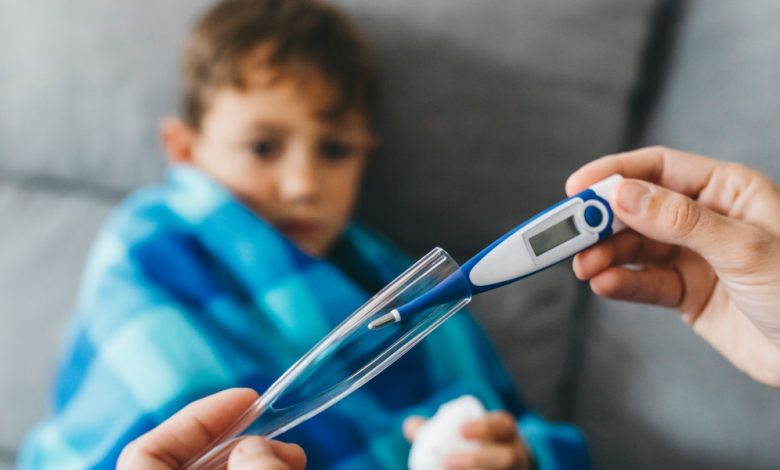That scratchy cough you have may not be COVID. Here’s how to tell if it’s another virus raging this winter

You – or your child – have a runny nose, fever and cough. Is it RSV or COVID? And does it even matter anymore?
Unfortunately, it’s impossible to tell the two apart without testing — even by coughing, experts say Wealth. But the answer is still important in determining the best treatment plan.
What is the difference between COVID and RSV?
Both COVID and RSV are highly contagious respiratory viruses. RSV, or respiratory syncytial virus infection, is a common illness that usually presents as a common cold. Almost everyone has contracted it by the age of 2, according to the CDC. But RSV is not mild for everyone. The virus hospitalizes tens of thousands of infants, young children and older adults in the United States each year and kills between 6,000 and 10,000 older adults in the United States annually, according to the national health agency.
RSV cases are regulating after a spike late last year. Levels of RSV, COVID and flu all rose dramatically at the same time – part of what some public health officials have called a “triple pandemic” conceded with the lifting of pandemic restrictions.
RSV symptoms can range from cold-like symptoms such as sneezing, sore throat, fever and nasal congestion to bronchiolitis and pneumonia, the latter of which can prove fatal. As with COVID, the young, the elderly and those with pre-existing health conditions may be more vulnerable. And both are distributed in the same way.
Of course, there are clear differences between the two, including mortality rates. But it’s easy to see why it’s impossible to tell the two apart without testing.
Are RSV and COVID coughs different?
Unfortunately, both COVID and RSV can lead to different types of coughs, including dry, wet, wheezing, and the like, Dr. Dan Olson, associate professor of infectious diseases and epidemiology at the Colorado School of Public Health at the CU Anschutz Medical Campus, narrates Wealth.
While children with a lower respiratory tract infection like RSV tend to wheeze, such sounds may only be noticeable to medical personnel. The typical non-clinician parent usually won’t be able to tell, says Dr. Ishminder Kaur, assistant professor of pediatric infectious diseases at UCLA Health Wealth.
How do RSV and COVID symptoms differ?
Both conditions have a possible overlap of runny nose/congestion, fever and cough.
But “in general, there are no distinctive clinical features that can clearly distinguish RSV from COVID-19 based on symptoms alone and without diagnostic tests,” says Kaur.
While there’s no surefire way to distinguish the two conditions without testing, there are some potential tells, experts say:
- Symptoms such as a headache, loss of taste or smell, or sore throat “can point away from RSV,” says Dr. Ali Alhassani, Head of Clinic at Summer Health Wealth.
- GI symptoms like nausea, vomiting, and diarrhea can occur with COVID, sometimes without respiratory symptoms, Kaur says. They do not usually occur in RSV.
- Children with COVID usually have a fever, while children with RSV may not, she adds.
- Sore throats are more common with COVID, Kaur says.
- Those with COVID sometimes get conjunctivitis (redness of the eyes) and skin rashes — symptoms not generally seen with RSV, she says.
Does it matter which one I have?
With society functioning as if the COVID-19 pandemic is over, does it even matter what you or a loved one has?
Yes, say experts. Because if treatment is required, a precise plan must be drawn up. Antivirals like Paxlovid are available to children and adults with COVID ages 12 and older. Although no specific treatment is available for RSV, both cases may require supportive care in a hospital. (And by the way, it’s possible to have both at the same time.)
If a child is at high risk for a severe outcome from COVID — because they’re obese or have an underlying condition — it’s even more important to determine if they have COVID, Kaur warns.
Can I test for COVID or RSV at home?
At-home test kits are of course available for COVID. But while there are at-home collection kits for RSV, they won’t give you results at home, says Alhassani. A trip to your doctor or urgent care is required.
When should I worry about my sick child?
Parents should take care of their children if they become one of the following witnesses, experts say Wealth:
- Rapid breathing or difficulty breathing which may look like a tightening of the chest wall and/or a fluttering of the nose
- Head wagging or pauses in breathing in young children
- lethargy
- dehydration (decreased urine output)
For RSV and COVID cases that aren’t emergencies, “parents may be more reluctant to go to the doctor’s office with long waits — and the possibility of you getting sicker in the waiting room,” says Alhassani.
But if your child’s symptoms don’t go away on their own after a few days, “maybe it’s time to see a pediatrician,” he advises.
Learn how to navigate and build trust in your organization with The Trust Factor, a weekly newsletter exploring what leaders need to succeed. Login here.



